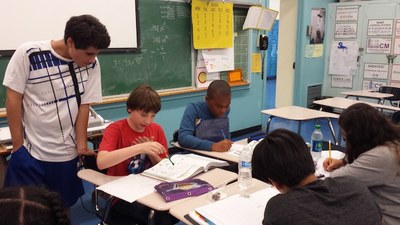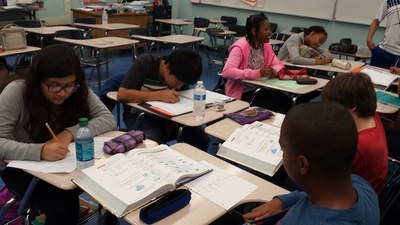After School Math Study Groups
Overview
6th and 7th grade After School Math Study Groups is held every Monday and Thursday from 3-5. Study groups is a space where students come to collaborate and work in groups on homework questions, study for tests, and get various questions answered from their peers and/or teacher. Students come voluntarily or are recommended to attend by a teacher.  Students work on homework for the first hour and then work on collaborative math activities for the second hour. I have enlisted the help of older students (11th and 12th graders) so that we are able to provide better supports for the students who attend.
Students work on homework for the first hour and then work on collaborative math activities for the second hour. I have enlisted the help of older students (11th and 12th graders) so that we are able to provide better supports for the students who attend.
My Role in After School Math Study Groups
- Lead study groups and find lessons/activities that help students better understand and appreciate math
- Provide support to those who may not be able to find it elsewhere due to financial reasons
- A colleague and I collaborate to find/create activities to use during the second part of math study groups. We provide students with collaborative activities and problems that help them think about math in ways different from the procedural, traditional aspect of many math classrooms.
- I have attempted to provide better support to students by having older students (11th and 12th graders) come in to tutor the younger students. I have reached out to the student government advisor as well as math teachers, providing them with an information/sign up sheet for students who are interested.
What I Have Learned
Study groups has been somewhat successful since my coworker and I volunteered to take over 6th and 7th grade groups. 6th and 7th grade study groups has always been difficult to manage because there never has been an organized or structured plan for the middle school students. Consequently, students tend to get disinterested in their work after an hour of study groups, which means they tend to get rowdy.  I wanted to provide more organized support for the 6th and 7th graders. The issues that have arisen throughout this project have been that:
I wanted to provide more organized support for the 6th and 7th graders. The issues that have arisen throughout this project have been that:
1) Students who come to collaborate and study with friends don’t find it appealing to have to work on other activities other than their homework with their friends for the entire 2 hours they are at study groups.
2) Finding time to plan for study groups has been difficult, especially because of the other responsibilities I have taken on this year.
3) There is no buy-in for students to be on task the entire time during study groups.
4) 11th and 12th graders that come in to help out with the 6th and 7th graders need more guidance, structure, and information on how to best help support these students. In addition, I’ve only had 4 11th and 12th graders come in to help with the younger students. My next steps are to create a structured club/program that enlists the help of older students for volunteer hours or the ability to write this club down as an extracurricular activity on their college transcripts.
Study groups needs to be restructured next year. How we will be restructuring 6th and 7th graders is being discussed.
CPSEL Connection
Standard 1: Facilitating the development, articulation, implementation, and stewardship of a vision of learning that is shared and supported by the school community.
1.5 - Shape school programs, plans, and activities to ensure that they are integrated, articulated through the grades, and consistent with the vision.
Standard 4: Collaborating with families and community members, responding to diverse community interests and needs, and mobilizing community resources.
4.3 - Incorporate information about family and community expectations into school decision-making and activities.
Standard 5: Modeling a personal code of ethics and developing professional leadership capacity.
5.4 - Make and communicate decisions based upon relevant data and research about effective teaching and learning, leadership, management practices, and equity.
5.6 - Demonstrate skills in decision-making, problem solving, change management, planning, conflict management, and evaluation.
Standard 6: Understanding, responding to, and influencing the larger political, social, economic, legal, and cultural context.
6.6 - View oneself as a leader of a team and also as a member of a larger team.

